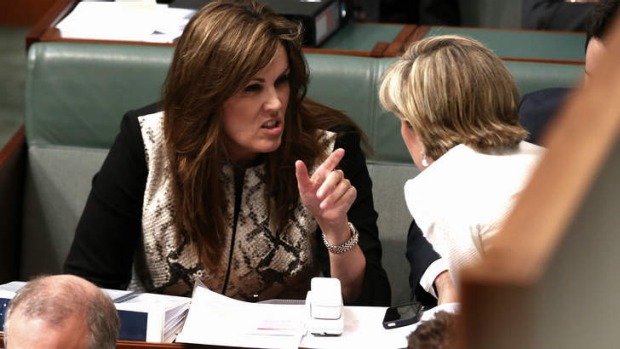Should Julie Bishop be afraid?

Rumour has it that Kevin Andrews will not contest the next election
and Peta Credlin will be gifted the safe seat of Menzies, and there are
good reasons why this might prove to be true.
Both are big players in Abbott’s Star Chamber as is Credlin’s
husband, Brian Loughnane. They certainly have the power to make this
happen.
”As for a Cabinet re-shuffle, “it’s really Tony and Peta’s decision,
there’s no point pretending otherwise”, the MP said, referring to the
Prime Minister and his chief of staff Peta Credlin, who has been
criticised for a perceived excess of power within the government.”
At first I thought Andrews unlikely to give up his position but on further reflection there could be some contributing factors.
Like the realisation that he is never going to become Prime
Minister. A couple of weeks before Tony Abbott rolled Malcolm Turnbull,
Kevin Andrews made an unsuccessful bid for the leadership. While he
seems to wield more power behind the scenes that Tony Abbott, he doesn’t
get to do the handshaking. Perhaps he feels he can do better
elsewhere.
He may return to his marriage counselling business since there is
plenty of government money on offer there. His publications could
become required reading as Andrews is an Adjunct Lecturer in Politics
and in Marriage Education in the John Paul II Institute for Marriage and
Family in Melbourne – an institution that has also just benefited from
newly offered government funding.
Andrews has been able to reward his backers. How else could one describe his repealing of gambling reform laws?
He has been able to impose his ideology in everything from school
chaplains to the categorisation as “leaners” of anyone who uses his
department’s services.
He has been able to oppose stem cell research, voluntary euthanasia, RU-486, and marriage equality.
As Minister for Immigration and Citizenship, Andrews set the tone for
Scott Morrison when he revoked on character grounds the visa of Dr
Mohamed Haneef, who had been granted bail on charges of aiding
terrorists. After the Director of Public Prosecutions dropped all
charges against Haneef, Andrews refused calls to reinstate Haneef’s
visa, stating that his personal evidence was still valid. Andrews’
justification of his decision, on the basis that he had a reasonable
suspicion that Haneef had associated with suspected terrorists and
therefore failed the test of good character that a person must pass to
keep a visa, was rejected in the Federal Court, and the revocation of
Haneef’s visa was overturned.
We have just voted to remove these safeguards.
Andrews is also a climate change sceptic so he can feel successful in dismantling any action on that too.
All in all, Kevin probably thinks job well done.
If, like me, you have wondered why Peta Credlin takes a seat at the
table in all meetings with foreign leaders, why she gets to host soirees
for Murdoch hacks and radio shock jocks at Kirribilli House, why she
gets to decide who gets what job and who may speak to the media and what
they may say, it may be now a bit clearer.
It seems obvious that Tony will have to be dumped sooner or later.
Could Peta be a double agent? After all, she is the person advising him
and look how abysmally he is doing.
My prediction? Peta wants to be Minister for Foreign Affairs and Trade on her way to the top job.
Look out Julie, the turd polisher is making a run.

















